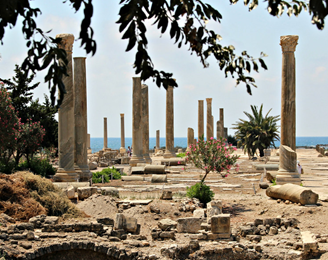Satan or prince of Tyre?
25-10-2011 - Posted by Andre Piettranslation: Peter Feddema
From a visitor to GoedBericht.nl, I received an email in which he commented to be rather confused on account of some people claiming that in Ezekiel 28 we have proof of Satan being a fallen angel. How can that be, he wondered? That chapter is about the prince of Tyre, is it not?
Indeed, this Bible Chapter is regarded to be the crown witness to the fall of Satan. This is remarkable, because Ezekiel 28 is about (the prince of) Tyre, as are the previous two chapters. Tyre, which lies on the coast of Lebanon, was in earlier days an island. The prince of Tyre was a exceptionally wise and understanding man (28:4) and developed his domain to impressive prosperity through trade (28:4,5). But as often is the case, it went to his head and he claimed: “I am a god, I sit in the seat of God, in the midst of the seas” (28:2,9). Against that background, Ezekiel had to proclaim a lamentation against the prince and prophesy his doom (28:12).
Let’s look at these verses (verses 12-15) and see, whether or not, behind the figure of the prince of Tyre, Satan himself is hiding. In verse 13, God reminds the prince of Tyre of his illustrious past. He was in the garden of Eden, overladen with every precious stone. The reference to the garden of Eden is so much more than a metaphor. From the previous chapter (27:22,23), we know that Eden was, literally, one of the places where the prince of Tyre was trading in precious stones.
In verse 14, the prince is called a “covering (lit. anointed) cherub. Assuming that this term also refers to the garden of Eden, it means that the prince is not linked to “the snake”, but to one of the cherubims who kept the garden (Gen.3:24). Furthermore, it is said that the prince was “on the holy mountain of God”. Is this then, nevertheless, about a god and not about a man? No, on the contrary! Because the language used here is the language of the prince, himself. He said, “…I am a god, I sit in the seat of God, in the midst of the seas” (28:2).
In verse 15, it is said of the prince that he was flawless from the day he was created. It has been argued: behind this prince, there must be concealed a spiritual being, since he was “created” and apparently not born, and initially, he also was blameless. But, for two reasons this is not possible. In the first place, it has already been said of the Ammonites (21:30) that they were created. Every man is a creature. That was true of Adam, who directly was formed from the earth, but it is also true of all his born-descendants–they are God’s creation. In the second place, the prince was perfect, that is ‘flawless’, as is often said, for instance, of sacrificial animals (Lev.1:3). The prince of Tyre was an unimpaired man. It is even said of him: “thou art wiser than Daniel, and no secret is hidden from thee” (28:3); “till iniquity was found in thee” (28:15). This refers to the time he became arrogant and imagined himself to be a god (28:2).
In the following verses (16-19), it is prophesied that the prince, together with his prosperous city, will utterly perish, because of his pride and injustice. The prince will be “brought down into the pit” and “die the death of the slain” (28:8).
In summary, we conclude that nothing in this chapter, not even in its remotest sense, is reminding us of Satan, neither explicitly nor implicitly. You might see a possible comparison with the cherub, who kept the garden of Eden; but that does not testify in favor, but rather against his alleged satanic identity.
That people have resorted to Eze.28 to prove that Satan is a fallen angel, shows the sad state of affairs with respect to the argumentation about this doctrine. Scripture knows nothing of a fall of Lucifer, who became Satan. We will have to accept the sober, biblical statement: “The devil is sinning from the beginning” (1Joh.3:8). And that the serpent, by none other than by God, Himself, is created (Gen.3:1 and Job 26:13). And God knew what he was doing …!

 English Blog
English Blog